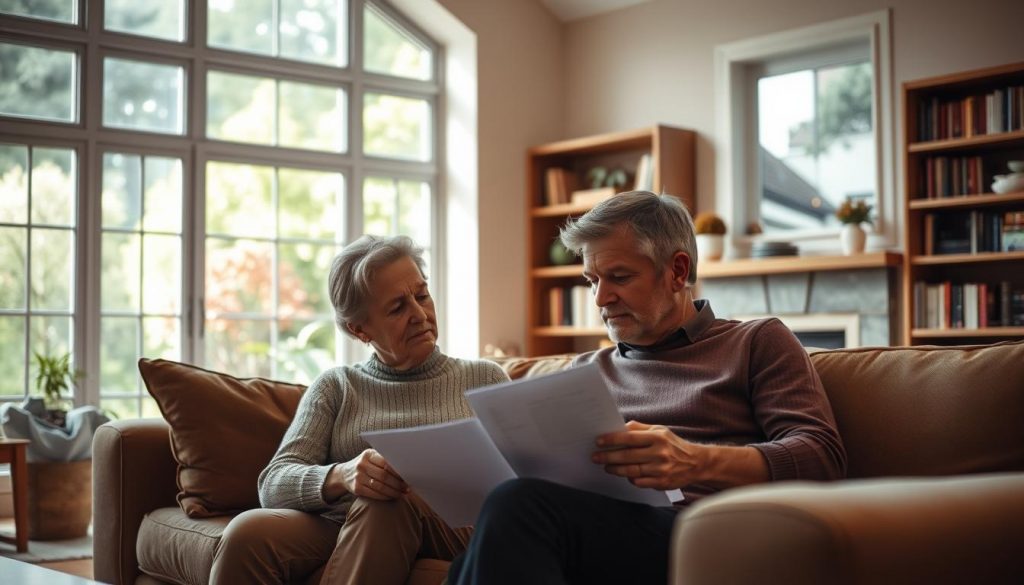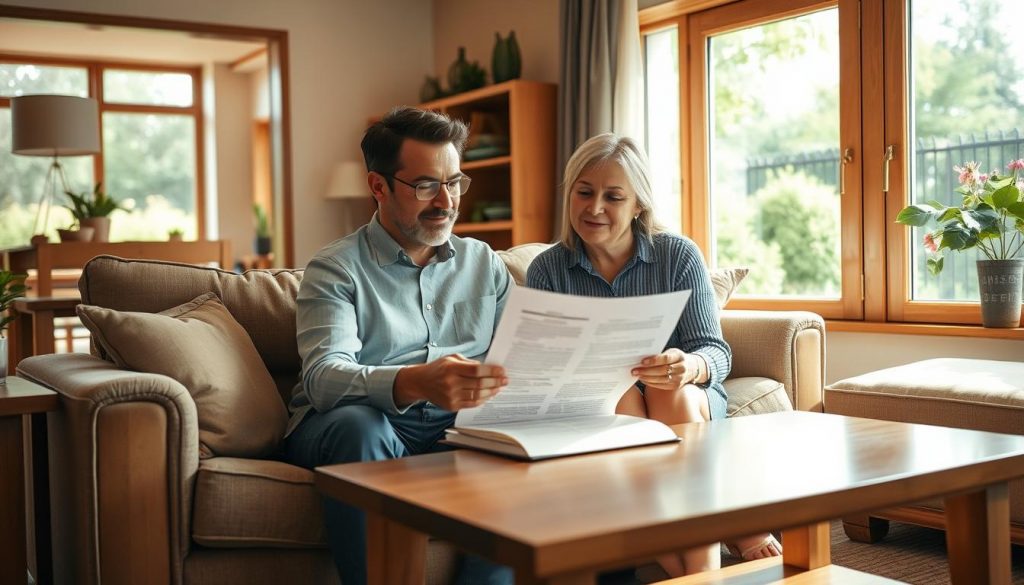As the number of cohabiting couples continues to rise, with 3.3 million recorded in 2017, according to the Office for National Statistics, it’s crucial for these individuals to understand their rights and responsibilities regarding estate planning.
Unlike married couples, unmarried partners do not automatically benefit from each other’s estate upon intestacy, nor do they enjoy the same tax breaks. At MP Estate Planning, we guide you through the process, ensuring your family’s future is protected.
We will explore the key areas that require consideration when advising cohabiting clients on estate planning matters.
Key Takeaways
- Cohabiting couples lack automatic rights to each other’s estate.
- Estate planning is crucial for protecting your family’s future.
- Tax breaks available to married couples are not applicable to unmarried partners.
- Proper planning ensures your wishes are respected.
- Seeking professional guidance is essential for navigating estate planning complexities.
Understanding the Importance of Estate Planning
As an unmarried couple, understanding and implementing estate planning can be the difference between security and uncertainty for the surviving partner. Estate planning is more than just a legal formality; it’s a way to ensure that your wishes are respected and your partner is protected in the event of your passing.

What is Estate Planning?
Estate planning involves making arrangements for the management and distribution of your assets after your death. It’s a process that allows you to make informed decisions about your estate, including property, savings, and other possessions. A well-crafted estate plan provides peace of mind, knowing that your loved ones will be taken care of according to your wishes.
For unmarried couples, estate planning is particularly important because the law does not automatically provide the same rights as it does for married couples or those in civil partnerships. Without a Will, an unmarried partner may not inherit your estate, potentially leading to financial hardship and legal disputes.
Why is it Crucial for Unmarried Couples?
The lack of automatic inheritance rights for unmarried couples can lead to significant challenges. As noted by experts, “Without a Will, an unmarried couple will not automatically share in the estate of the other when one of them dies. The only remedy the survivor has is to apply to the courts for a share of the estate.” This process can be both emotionally taxing and costly.
“Estate planning for unmarried couples is not just about distributing assets; it’s about protecting the future of your loved ones.”
By engaging in estate planning, unmarried couples can ensure that their partner is provided for. This includes making a Will, setting up trusts, and considering other legal protections. For more information on inheritance rights for unmarried couples, you can visit our dedicated resource.
Ultimately, estate planning is a proactive step towards securing your and your partner’s future. It allows you to make key decisions about your estate, ensuring that your wishes are respected and your partner is protected.
Legal Rights of Unmarried Couples in the UK
Many assume that long-term cohabitation grants legal rights similar to marriage, but this is not the case in the UK. Unmarried couples often face significant legal challenges when it comes to estate planning and inheritance.
Common Law Marriage Myth
The concept of common law marriage is a common misconception. In reality, UK law does not recognize common law marriage, and cohabiting couples do not have the same automatic rights as married couples. This means that if the relationship ends or one partner dies, the surviving partner may not have the same legal protections.
Key Legal Protections
Although unmarried couples lack the automatic rights afforded to married couples, there are still legal protections that can be put in place to safeguard their interests. For instance, estate planning strategies can help ensure that your partner is protected.
- Cohabitation agreements can outline the rights and responsibilities of each partner.
- Wills and trusts can be used to secure your partner’s financial future.
- Powers of attorney can grant your partner the authority to make decisions on your behalf.
Property Ownership Considerations
Property ownership is a critical aspect of estate planning for unmarried couples. The way property is owned can significantly impact the legal rights of each partner.
| Ownership Type | Description | Implications |
|---|---|---|
| Joint Ownership | Both partners own the property together. | Upon one partner’s death, the property automatically passes to the surviving partner. |
| Individual Ownership | One partner owns the property. | The deceased partner’s share may be subject to inheritance tax and may not automatically pass to the surviving partner. |
Understanding these considerations can help unmarried couples make informed decisions about their estate and ensure that their partner’s interests are legally protected.
Wills: A Fundamental Tool for Estate Planning
In the UK, unmarried couples can benefit significantly from having a Will, as it provides a clear outline of how their estate should be managed and distributed after they’re gone. A Will is a legal document that outlines an individual’s wishes regarding the distribution of their assets, property, and other possessions after their death.
Importance of Having a Will
Having a Will is crucial for unmarried couples because, unlike married couples, they do not have automatic rights to each other’s estate upon death. Without a Will, the laws of intestacy apply, which may not reflect the deceased’s wishes or provide for their partner adequately. As Andrew Copus, a leading UK estate planning expert, once said, “A Will is the cornerstone of estate planning, providing peace of mind and financial security for loved ones.”
One of the key reasons a Will is essential is that it allows unmarried couples to make financial provisions for their surviving partner. Since there’s no applicable “relationship-based” inheritance tax exemption, any gift to the cohabiting partner will utilise some or all of the available nil rate band. By having a Will, couples can ensure that their partner is taken care of and that their wishes are respected.
Drafting a Will as an Unmarried Couple
Drafting a Will as an unmarried couple requires careful consideration of several factors, including the distribution of assets, property ownership, and provisions for any children. It’s advisable to seek the guidance of estate planning solicitors who specialise in advising unmarried couples. They can help ensure that the Will is valid, reflects the couple’s wishes, and minimises potential disputes or challenges.
When drafting a Will, it’s essential to consider the following:
- Clearly outline the distribution of assets, including property, savings, and other possessions.
- Appoint executors who will manage the estate according to the Will.
- Consider making provisions for any children or dependents.
- Review and update the Will regularly to reflect any changes in circumstances.
By having a well-drafted Will, unmarried couples can ensure that their estate is managed according to their wishes, providing peace of mind and financial security for their loved ones.
Trusts: An Alternative for Estate Management
Trusts offer a flexible and effective way for unmarried couples to manage their estate in the UK. By utilizing a trust, couples can ensure that their assets are distributed according to their wishes, providing peace of mind and financial security for their loved ones.
Understanding Trusts
A trust is a legal arrangement where one party (the settlor) transfers assets to another party (the trustee) to manage for the benefit of a third party (the beneficiary). Trusts can be tailored to meet the specific needs of unmarried couples, providing a high degree of control and flexibility.
There are several types of trusts, including discretionary trusts, which give trustees the power to decide how and when to distribute income or capital. This can be particularly useful for unmarried couples who want to ensure that their assets are managed in the best interests of their beneficiaries.
Benefits of Using a Trust
Using a trust in estate planning offers several benefits for unmarried couples. Some of the key advantages include:
- Flexibility: Trusts can be tailored to meet the specific needs of the couple, allowing for flexible management of assets.
- Control: By appointing trustees, couples can ensure that their assets are managed according to their wishes.
- Protection: Trusts can provide protection for assets against creditors or other claimants.
- Tax Efficiency: Certain trusts can offer tax benefits, although this should be considered in the context of current tax laws and individual circumstances.
| Type of Trust | Description | Benefits |
|---|---|---|
| Discretionary Trust | Gives trustees the power to decide how and when to distribute income or capital. | Flexibility, control, and protection of assets. |
| Interest in Possession Trust | Provides a beneficiary with an immediate income or capital entitlement. | Immediate benefit to the beneficiary, potential tax benefits. |
| Bare Trust | The beneficiary has an absolute entitlement to the trust assets. | Simple and straightforward, with clear beneficiary rights. |
As illustrated in the table above, different types of trusts offer various benefits and can be chosen based on the specific needs and circumstances of the unmarried couple.

In conclusion, trusts can be a valuable tool in estate planning for unmarried couples in the UK, offering flexibility, control, and protection. By understanding the different types of trusts and their benefits, couples can make informed decisions about their estate management.
Inheritance Tax Considerations for Unmarried Couples
Unmarried couples face unique challenges when it comes to inheritance tax, as they don’t benefit from the same exemptions as married couples or civil partners. This makes it crucial for them to understand how inheritance tax works and how it might affect the assets they leave behind for their partner.
Understanding Inheritance Tax Thresholds
In the UK, inheritance tax is levied on the estate of someone who has passed away, including their property, money, and possessions. The standard inheritance tax rate is 40%, but it only applies to the portion of the estate that exceeds the nil-rate band, which is currently set at £325,000. There’s also an additional residence nil-rate band of £175,000, applicable if you leave your main residence to direct descendants, such as children or grandchildren.
For unmarried couples, it’s essential to understand that there’s no automatic exemption for the surviving partner, unlike for married couples or civil partners. This means that if you leave assets to your partner, they could be subject to inheritance tax if the estate’s value exceeds the nil-rate band.
When Inheritance Tax Applies
Inheritance tax becomes applicable when the total value of the deceased’s estate exceeds the available nil-rate bands. For an unmarried couple, this could mean that the assets left to the surviving partner are taxed at 40% if the threshold is exceeded. However, gifts or transfers between partners during their lifetime can be strategically planned to reduce the estate’s value and thus minimise inheritance tax liabilities.
It’s also worth noting that certain exemptions and reliefs can reduce the inheritance tax burden. For instance, leaving assets to charity can reduce the taxable estate, and some business and agricultural property reliefs may apply. Understanding these nuances is key to effective estate planning for unmarried couples.
Joint Ownership vs. Individual Ownership
Understanding the implications of joint versus individual ownership is crucial for unmarried couples planning their estate. The way you choose to own property can significantly impact your financial security and your ability to protect your partner’s interests.
How to Jointly Own Property
Joint ownership can be structured in two main ways: as joint tenants or as tenants in common. When you own property as joint tenants, both partners own the property equally, and the survivor inherits the whole property automatically upon the other’s death. This is often the preferred choice for married couples, but it can also be suitable for unmarried partners who wish to ensure that the surviving partner retains ownership of their shared home.
On the other hand, tenancy in common allows partners to own different shares of the property, which can be passed on to beneficiaries as they see fit. This can be particularly useful if one partner has contributed more to the purchase of the property or if you wish to leave your share to someone other than your partner.

Implications of Individual Ownership
Owning property individually means that each partner has complete control over their own share. While this can provide a sense of security and independence, it also means that the surviving partner may face challenges if the deceased partner’s share is not automatically transferred to them.
For unmarried couples, individual ownership can lead to complications, particularly if there is no Will or if the Will does not adequately provide for the surviving partner. It is essential to consider the potential implications and plan accordingly to ensure that your partner’s interests are legally protected.
When deciding between joint and individual ownership, it’s crucial to consider your long-term financial planning and the overall strategy for protecting your partner’s interests. We recommend seeking professional advice to determine the most suitable approach for your specific circumstances.
Power of Attorney: Making Key Decisions
Power of attorney is a vital component of estate planning that allows a partner to make key decisions when the other is unable. This legal arrangement ensures that your interests are protected and your wishes are respected, even if you lose the capacity to make decisions for yourself.
Financial Power of Attorney
A financial power of attorney grants your partner the authority to manage your financial affairs. This can include tasks such as:
- Managing bank accounts
- Handling investments
- Dealing with property transactions
By granting financial power of attorney, you ensure that your partner can make crucial financial decisions on your behalf, safeguarding your assets and financial well-being.
Health and Welfare Power of Attorney
A health and welfare power of attorney allows your partner to make decisions regarding your health and welfare. This can include:
- Choosing medical treatments
- Deciding on care arrangements
- Making decisions about life-sustaining treatment
Having a health and welfare power of attorney in place provides peace of mind, knowing that your partner can make decisions that align with your wishes and values.
For unmarried couples, having both financial and health and welfare powers of attorney is crucial. It ensures that your partner can act in your best interests across various aspects of your life. If you’re looking for professional guidance on estate planning, including setting up a power of attorney, consider consulting with estate planning solicitors who specialize in supporting unmarried couples in the UK.
Protecting Children in Estate Planning
Protecting your children’s interests is a vital aspect of estate planning for cohabiting couples. As an unmarried couple, it’s essential to consider the welfare and well-being of your children in the event of unforeseen circumstances.
Arrangements for Children’s Welfare
When planning for your children’s welfare, you need to consider several key factors. These include:
- Who will care for your children if you both pass away?
- How will their financial needs be met?
- What are your wishes regarding their education and upbringing?
Making these decisions can be challenging, but having a clear plan in place can provide peace of mind. It’s also crucial to discuss and agree on these matters with your partner to ensure you’re both on the same page.
Guardianship Considerations
One of the most critical decisions you’ll make is choosing a guardian for your children. This person will be responsible for their care and well-being if you’re no longer able to. When selecting a guardian, consider:
- Their ability to provide a stable and loving environment
- Their values and parenting style
- Their willingness to take on the responsibility
It’s also a good idea to name an alternate guardian in case your first choice is unable to fulfill the role.
By making these arrangements, you can ensure that your children’s needs are met and their future is secure. This not only provides you with peace of mind but also protects their well-being.
Seeking Professional Advice
Effective estate planning for unmarried couples requires careful consideration and professional guidance. We understand that navigating the complexities of wills and trusts for unmarried partners can be challenging, but seeking expert advice can provide peace of mind.
When to consult an estate planner is a crucial decision. We recommend seeking professional advice as soon as possible, especially when significant assets are involved or when there are children to consider. An experienced estate planner will help you create a tailored plan that addresses your specific needs and ensures that your wishes are respected.
Expert Guidance for Estate Planning
Choosing the right legal representation is vital for effective estate planning for unmarried couples. Look for solicitors or estate planners with experience in handling cases involving unmarried partners. They will be able to guide you through the process, ensuring that your estate is planned effectively and that your loved ones are protected.
By seeking professional advice, you can ensure that your estate planning needs are met, and your wishes are carried out. We are here to guide you every step of the way.


